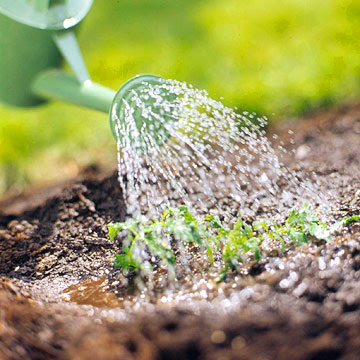 Step 1: Mark it Out
Step 1: Mark it Out
Make your new garden
the best it can be. Give it a fun shape with flowing curves or use it
to echo the lines of your house. Get it just right by laying out a hose
to outline your bed. Once you have the perfect shape, mark the edges with a line of sand or flour.Step 2: Get Rid of the Grass
If you have grass growing in your new garden spot, dig it up with a spade or sod cutter. Or, if you have time to wait, mow that area as low as you can, then cover it with a several-sheet-thick layer of newspaper and several inches of soil or compost. Wait a couple of months for the grass to die.
Step 3: Dig It Up!
Now comes the digging. Dig up or till your new garden, removing any rocks, roots, or other debris. If you have poor soil, now's also a great time to incorporate organic matter, such as compost. Just dig it in while you work the ground.
 Step 4: Edge Your New Bed
Step 4: Edge Your New Bed
Keep the lawn from crawling into your garden
with a good edge. A trench about 8 inches deep and a couple of inches
wide will stop even the worst invaders from crossing. Alternatively,
sink an edging material around the perimeter of your garden.Step 5: Site Your Plants
 Though
it takes a little extra time, placing all your plants before you put
them in the ground can make a world of difference. This allows you to
get the spacing just right and make your plants really will look good
next to each other.
Though
it takes a little extra time, placing all your plants before you put
them in the ground can make a world of difference. This allows you to
get the spacing just right and make your plants really will look good
next to each other.Step 6: Get Planting
When you know all of your plants are in exactly the right spots, plant them in the ground. It's helpful to loosen or tease the plants' roots before you put them in the ground, especially if they were root-bound.Step 7: Spread Mulch
Other than amending the soil, the best thing you can do to keep your new garden healthy and low-maintenance is to spread mulch. A 2-inch-deep layer of shredded wood or other material will do wonders for stopping weeds and helping your soil conserve moisture during times of drought.Step 8: Water It In
Once your bed is planted and mulched, give your plants a good soaking. Hint: If your mulch is dry, it may absorb some water before your plants can. Soak dry mulch well to make sure your plants get enough moisture.Source By: http://www.bhg.com/gardening/yard/garden-care/building-a-new-garden/#page=1
















0 comments:
Post a Comment